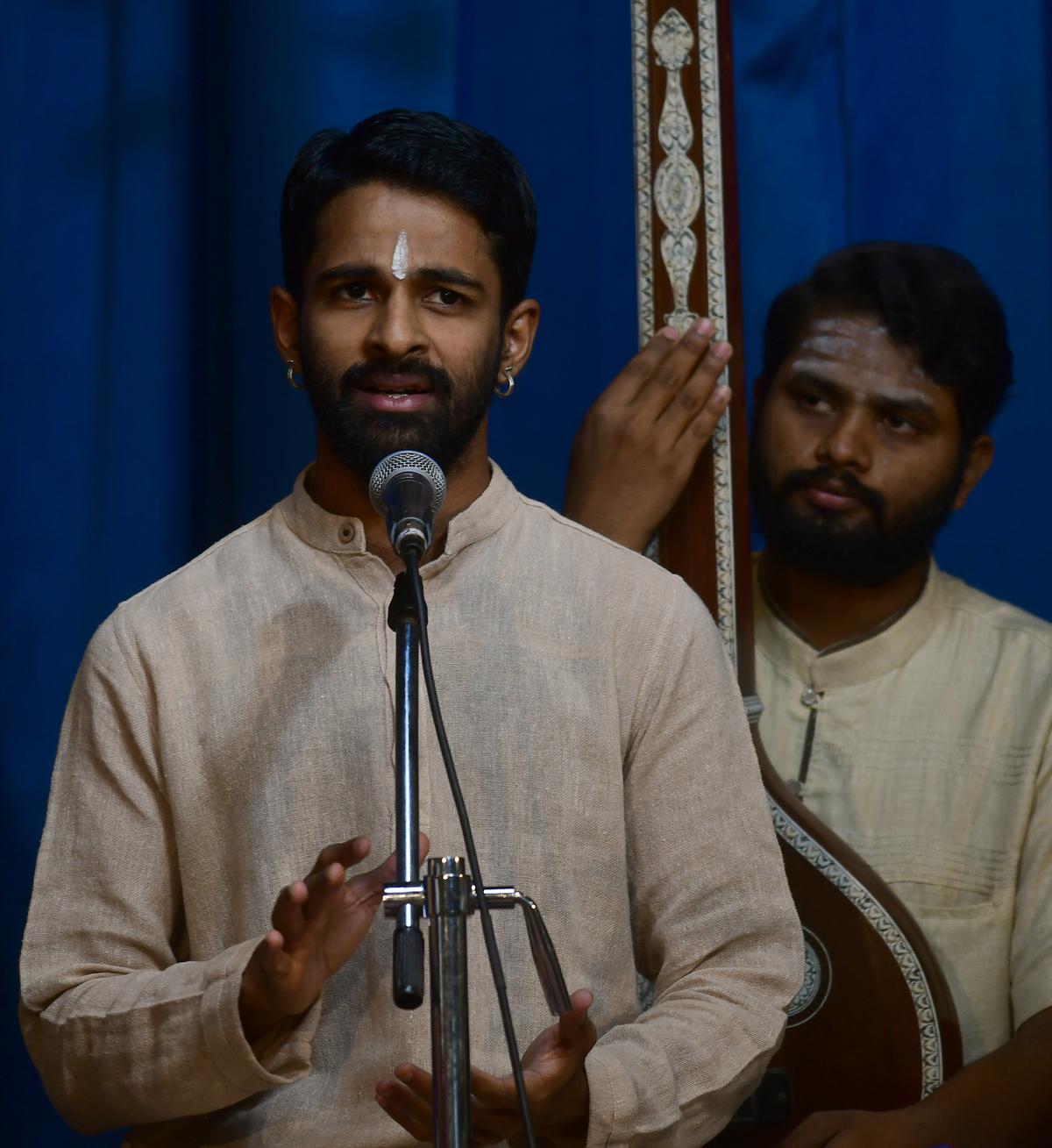Anugrah Lakshmanan impresses with his singing of Madhurakavi Azhwar’s verses

Anugrah Lakshmanan’s performance at Naada Inbam, Ragasudha Hall, Luz, Mylapore, April 2023. Accompanied by V.S.P Gayatri Sivani on the violin, Mannarkoil J. Balaji on the mridangam and S. Krishna on the ghatam.
| Photo Credit: SRINATH M
Anugrah Lakshmanan presented a short thematic concert dedicated to compositions in praise of Vishnu and his various manifestations. His co-artistes that evening were V.S.P Gayatri Sivani on the violin, Mannarkoil J.Balaji on the mridangam and S. Krishna on the ghatam.
The concert began on a bright note with Swati Tirunal’s Aarabhi piece ‘Narasimha Mamava’. This was followed by a Tamil composition in Asaveri ‘Sharanam sharanam raghurama’. This composition by Arunachala Kavi is usually rendered at a sprightly pace. Anugrah chose to present it in a steady and slow fashion projecting the intricate nature of the raga.

Anugrah Lakshmanan’s performance at Naada Inbam, Ragasudha Hall, Luz, Mylapore, in April 2023.
| Photo Credit:
SRINATH M
Saranga is a tricky raga to navigate when it comes to alapana as it is strongly phrase-based. Repetition during elaboration becomes inevitable due to the usage of certain specific phrases to bring out the unique flavour of the raga. However, Anugrah smartly utilised the limited scope of the raga even though he only made a short foray into it. During her turn, Gayatri brought out some of the quintessential Saranga phrases centred around its two madhyamams. Muthuswami Dikshitar’s ‘Varadarajam upasmahe’ was rendered. The kalpanaswaras were sung at two points (at the lower and upper shadjam) in the madhyama kala sahityam. It was an astute move to present a set of durita kala swaras in the otherwise unhurried kriti.
A Bhairavi alapana that began briskly at the upper rishabham set the tone for the main piece ‘Odi baarayya’ by Purandaradasa. The highly discernible aspect of the alapana was its free-flowing and meandering nature, unshackled by sequential sthayi progressions. One only wished it could have been longer, beyond the obligatory five minutes. Niraval and kalpanaswaras were presented at ‘Mangalaanga’, which was followed by a brief tani.
The concert concluded with Madhurakavi Azhwar’s ‘Kanninun chiruthambu’, a set of 11 verses in praise of the Vaishnavite saint Nammazhwar, who is considered to be the foremost among the twelve Azhwars. These verses were tuned by Anugrah himself after obtaining appropriate inputs about the moods and contexts of each verse from ghatam vidwan S. Krishna. Collaborations between co-artistes regarding specialised subjects outside music are refreshing and need to be welcomed. The usage of Kedaragowla for the second verse, where Madhurakavi expresses joy when spelling out his Acharya’s name, was quite apt. The poignant raga Bowli was a sensible choice for the sixth verse that stresses Nammazhwar’s unwavering support to Madhurakavi.
Mannarkoil J. Balaji, being the veteran that he is, provided unobtrusive support throughout the concert. He and Krishna tactfully coordinated at several points throughout the concert, appropriately balancing resonance and restraint.
For all the latest Entertainment News Click Here
For the latest news and updates, follow us on Google News.
